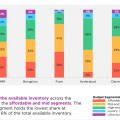The complexities in the partial ownership of a house or a building have been making the news in Chandigarh housing and in commercial real estate. A news story by The Tribune Chandigarh says that the homebuyer becomes only a co-owner or co-sharer to the extent of his shareholding in the entire site or building, which remains in joint ownership (source).
The Bench of Justice Tejinder Singh Dhindsa and Justice Vivek Puri also made it clear that the Chandigarh Administration did not recognise a homebuyer’s ownership rights over any floor or part of a site or a building by the virtue of purchase of a share or a memorandum of understanding entered into by the co-sharers.
The Chandigarh administration was also directed to take necessary steps to criminally prosecute the persons “who may misrepresent through any medium as regards sale of floor or storey or a specific portion of a site or building”.
The Salient features as taken from The Tribune story (source)
- Mere construction of three floors on a private plot and using these as independent units does not mean fragmentation. It would take place only if there is a division of the site or building with an element of exclusive ownership— as a partition by metes and bounds. It, in turn, stood prohibited by virtue of Rule 16 of the Estate Rules.
- The sale of share does not mean fragmentation. A co-owner could occupy specific or separate portions of the joint holding. The status of such property remains “joint” and this *Joint* status ends only upon severance of ownership by a partition by metes and bounds. It, in turn, would fall within the scope and ambit of ‘fragmentation’.
- Specific portion under the occupation of a co-owner was not accorded any recognition by the Estate Officer in any manner. The co-owner did not become the sole and exclusive owner of such specific portion under his occupation. Occupation or the possession of a specific portion whether it is a floor of a joint property by a co-owner, does not mean ‘apartmentalisation’.














No Comments
Leave a comment Cancel